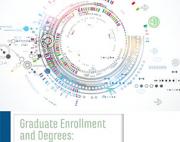You are on CGS' Legacy Site.
Thank you for visiting CGS! You are currently using CGS' legacy site, which is no longer supported. For up-to-date information, including publications purchasing and meeting information, please visit cgsnet.org.

PRESS RELEASE
Contact: Katherine Hazelrigg (202) 461-3888 / khazelrigg@cgs.nche.edu
Graduate Applications Flat, First-time Enrollment on the Rise Overall
Washington, DC — Graduate degree holders representing diverse backgrounds will play a key role in driving innovation and discovery in the U.S. workforce, and new data from the Council of Graduate Schools (CGS) on graduate enrollments and degrees provide a revealing snapshot of the country's progress in meeting these demands. According to a CGS report released today, graduate applications were flat (-0.6%) and first-time graduate enrollment (2.5%) increased overall for the Fall 2019 semester. While graduate schools reported overall increases in the first-time enrollment of minority students between Fall 2018 and Fall 2019 (Latinx +5.7%, Black/African American +5.5%, Asian +5.3%, and American Indian/Alaska Native +3.5%), students from these demographic groups remain substantially underrepresented as percentage shares of the graduate student population, particularly in STEM fields. These data are part of the latest CGS/GRE Graduate Enrollment & Degrees: 2009-2019 report.
“The growth in first-time enrollment rates for a second year, along with the continued increases in first-time enrollment among Latinx, Black/African Americans, Asians/Pacific Islanders, and American Indian/Alaska Natives graduate students are encouraging,” said CGS President Suzanne Ortega. “But we still have so much work to do. I’m particularly concerned about the disproportionate economic effects of the COVID-19 pandemic on underrepresented minorities (URM). The modest gains the U.S. has seen over the past ten years in URM and first-generation graduate student enrollment and degree completion are in real jeopardy.”
In an effort to examine the obstacles URM students have faced in their matriculation, persistence, and completion of STEM graduate programs in the wake of the COVID-19 pandemic, CGS, the Council for Opportunity in Education (COE) and the Council of Historically Black Graduate Schools (CHBGS) are collaborating on an NSF-funded RAPID Investigating Challenges to Matriculation and Completion for Underrepresented STEM Graduate Students during the COVID-19 Pandemic. According to Ortega, “The pandemic has introduced a new set of challenges that we need to understand and be prepared to address quickly, but there are a number of things we already know we could be doing better, including recruiting and retaining a more diverse faculty, fostering a more inclusive learning environment, and addressing the financial barriers to degree completion.”
First-time Enrollment in Engineering Rebounds, Continued Growth in Health Sciences and Mathematical and Computer Sciences
After declining in the previous four years, first-time enrollment in Engineering increased 4.8% at the doctoral level and 5.1% at the master’s level between Fall 2018 and Fall 2019. The overall growth in first-time enrollment of international students (3.8%) contributed to rebound in engineering fields, which reported a 3.3% increase in international students. Other trends by broad field of study are generally consistent with the last few years. In addition to the broad field of Engineering, the largest one-year gains in first-time enrollment by broad field of study were in Mathematics and Computer Sciences (5.7%), Health Sciences (3.5%), and Other Fields (6.9%). In contrast, first-time graduate enrollment in Education over the same period flattened (+0.4%) after previous years of growth.
Institutions responding to the CGS/GRE Survey of Graduate Enrollment & Degrees for Fall 2019 enrolled more than 1.8 million graduate students. Nearly three quarters (73.5%) of total graduate enrollment was in master’s programs. Over one million of those graduate students, or 58.5%, were women. The three largest broad fields of study (education, business, and health sciences) were also the fields with the largest proportions of part-time graduate students (Ed: 63.7%; Bus: 51.7%; HSci: 41.2%).
About the report
Graduate Enrollment and Degrees: 2009 to 2019 presents the findings of an annual survey of U.S. graduate schools, co-sponsored by CGS and the Graduate Record Examinations (GRE) Board. It is the only annual national survey that collects data on graduate enrollment by all fields of study and is the only source of national data on graduate applications by broad field of study. The report includes responses from 561 institutions and presents statistics on graduate applications and enrollment for Fall 2019, degrees conferred in 2018-19, and trend data for one-, five- and ten-year periods.
###
The Council of Graduate Schools (CGS) is an organization of approximately 500 institutions of higher education in the United States and Canada engaged in graduate education, research, and the preparation of candidates for advanced degrees. The organization’s mission is to improve and advance graduate education, which it accomplishes through advocacy in the federal policy arena, research, and the development and dissemination of best practices.




